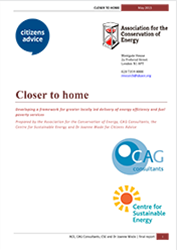Closer to home
Developing a framework for greater locally led delivery of energy efficiency and fuel poverty services
 In our Closer to home [ 4.4 mb] report, we investigate the case for the local delivery of home energy efficiency and fuel poverty services. A local delivery approach is one in which the people from an area are involved in delivering energy efficiency measures in that area, supported by a framework that enables or requires this to happen.
In our Closer to home [ 4.4 mb] report, we investigate the case for the local delivery of home energy efficiency and fuel poverty services. A local delivery approach is one in which the people from an area are involved in delivering energy efficiency measures in that area, supported by a framework that enables or requires this to happen.
Head of Fuel Poverty William Baker's blog
 Discusses giving responsibility to local authorities to oversee the delivery of energy efficiency improvements for low income households.
Discusses giving responsibility to local authorities to oversee the delivery of energy efficiency improvements for low income households.A wide-ranging research programme was carried out to explore the opportunities and barriers to setting up a local delivery model. The research combined literature review, expert stakeholder interviews, a survey of local authority officers, regional workshops and a final policy workshop to test emerging ideas.
The research found that there was extensive support for setting up a national framework for local delivery, with many considering it would have substantial advantages over current arrangements. Potential benefits included:
- more effective targeting of fuel poverty, particularly the ‘hard to reach’ and most vulnerable
- facilitate the use of area-based approaches
- allow interaction with other local policy objectives and thus potential lever in additional funds
- greater flexibility to address local housing and household circumstances.
There was widespread agreement that the current reliance in England on the Energy Efficiency Obligation alone to improve the energy efficiency standards of low-income homes was not working.
The main obstacles to setting up a local delivery framework were regarded as local authority procurement procedures, uneven assessments across authorities of housing stock and household needs and uneven experience of putting together complex funding bids and following these through to implementation.
There was particular concern that recent cuts to English local authority budgets has meant that many are struggling to meet existing statutory duties, let alone take on new ones, even if resourced. However, recent government announcements about plans to give greater powers to local authorities give cause for optimism.
This executive summary outlines the research findings and detailed proposals for the local delivery of energy and fuel poverty services. There is also a separate summary of the report’s recommendations [ 54 kb].

